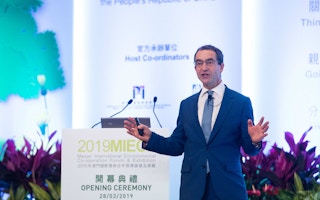By 2040, solar and wind power will make up a third of the world’s electricity supply, a third of the vehicles on roads will be electric, and the global economy will achieve one-third more gross domestic product (GDP) from every unit of energy, putting the world closer to the goals of the Paris Agreement even if they will not be enough to achieve them.
In fact, these projections are conservative estimates that do not take into account promising research and developments in the respective fields, said Michael Liebreich, the keynote speaker of the recent Macao International Environmental Co-operation Forum & Exhibition (MIECF) 2019, who is chairman and chief executive of London-based sustainable development advisory services firm Liebreich Associates.
Held from March 28 to 30 at the Venetian Macao, the annual MIECF was hosted by the Macao government, and had Promoting Ecological Civilization and Green Development as its theme this year.
The “three-third” world
Liebreich, who also founded New Energy Finance and chaired the advisory board when it subsequently became Bloomberg New Energy Finance, pointed to several trends that underpin his predictions of this “three-third world” which were presented during his keynote speech and in a session focused on green industry.
Due to falling costs, unsubsidised solar and wind power are now the cheapest forms of electricity in most parts of the world and the lowest costs today will become commonplace. “We are now well into the world of very cheap wind and solar power,” he said.
“The tipping points where wind and solar become cheaper than coal and gas have already happened, so we’re already seeing around the world countries shutting down or mothballing existing coal and gas power plants and moving to renewables,” he continued.
“
If your portfolio needs to be very different in 2030, you need to start the process of changing it this afternoon, not in 2028.
Michael Liebreich, chairman and chief executive, Liebreich Associates
In the area of transportation, sales of electric vehicles have grown throughout most of the world between 2012 and 2018, with a compound annual growth rate of 54 per cent in the Americas, 62 per cent in Europe, the Middle East and Africa, 86 per cent in Asia Pacific, fuelled by rapid deployment in China, according to statistics compiled by Bloomberg’s New Energy Finance research firm, which Liebreich founded and sold to the American media giant in 2009.
The world’s manufacturing capacity of lithium-ion batteries, which are commonly used in electric vehicles, will also triple from 303,173 megawatt hours (MWh) in 2018 to 951,998 MWh in 2026, based on the capacity of the plants that are under construction and that have been announced and commissioned.
Two business cycles to change the world
Still, these developments will not be enough to accomplish the goals of the Paris Agreement. “It’s important to get governments, businesses and the capital markets working really well together to scale other innovative solutions,” said Liebreich.
“We’ve got to get a whole mechanism working where the state helps with the early, deep science stage, businesses take the innovations and technologies and work out how to get it to market, and finance flows in from the capital markets to scale the economical and effective solutions,” he said.
He added that corporations and investors have to start making their portfolios more environmentally-friendly because the world has just 12 years – equivalent to two business cycles – to avert catastrophic global warming, according to the Intergovernmental Panel on Climate Change.
“If your portfolio needs to be very different in 2030, you need to start the process of changing it this afternoon, not in 2028. If you don’t start to reduce your carbon emissions now, by 2030, you may be operating in a world where we no longer have a carbon budget and every single tonne of emissions is socially unacceptable,” he explained.
Conferences such as the MIECF can help, he added. “Most conferences want to talk about electric vehicles, solar, wind, the next big thing, whereas MIECF 2019 has a big focus on what I would call ‘remediative’ environmental issues, specifically water and air pollution remediation, waste management and other such issues. These are just as important.”
He added that countries also need to focus on green growth if they have not already started to do so. “Growth is generally measured by GDP, but that does not correlate with human well-being particularly well. We need to measure growth more carefully and make it a balance sheet that includes all the good things we need in the world, such as our natural capital.”
He noted that rapid change has occurred in several sectors, showing that it is possible for the world to meet the Paris Agreement targets: “In the past six years, we’ve seen coal-fired power in Britain drop from over 40 per cent to under 5 per cent, LED lights go from less than 5 per cent to more than 40 per cent of the global lighting market, and plug-in vehicles in Norway soar from 5 per cent of sales to nearly 50 per cent.”
He concluded: “People, businesses, investors, governments, everyone has to start to think about what they can do now to cut their emissions. We can’t wait until 2030.”
MIECF will return next year for its 13th edition from March 28 to 30, 2020.





















